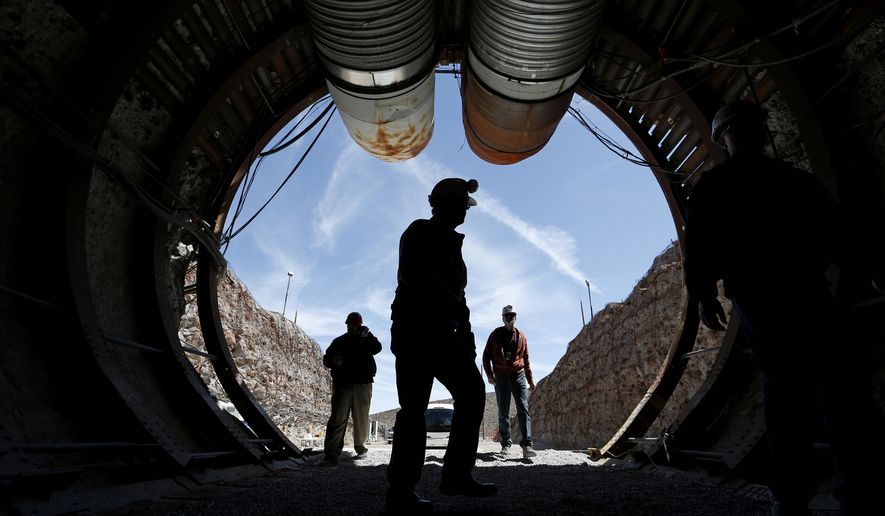The White House’s plan to revive a nuclear waste dump at Nevada’s Yucca Mountain has pushed President Trump into an all-out war with Las Vegas, as powerful casino owners and city economic leaders vow to fight the administration tooth and nail over the proposal.
Mr. Trump’s 2018 budget proposal calls for $120 million to restart licensing procedures for the Yucca Mountain nuclear waste repository, which would be less than 90 miles from the Las Vegas Strip and would store roughly 77,000 tons of used nuclear fuel that now sits at sites across the country.
Administration officials argue that they have an obligation to find a permanent burial ground for that fuel and that it’s long past time to push back critics and get the facility up and running.
The proposal will face stiff resistance in Congress, especially from lawmakers representing Nevada, but perhaps the toughest opposition will be from some of the same figures with whom Mr. Trump worked while building his businesses in Las Vegas.
“The driver of our economy is tourism, and what Yucca Mountain would mean is the storing of 77,000 tons of nuclear waste less than 90 miles from Las Vegas,” said Cara Clarke, associate vice president of communications at the Las Vegas Metro Chamber of Commerce. “The Las Vegas economy is overwhelmingly driven by tourism and visitors feeling confident and safe coming to our community. We do all we can to protect that.”
Ms. Clarke said the Chamber will be in Washington this fall and plans to raise its concerns over the Yucca Mountain proposal with administration and congressional officials.
“Any potential accident or scare that could damage people’s view of Las Vegas or desire to come here to visit is a major concern to us,” she said.
The Chamber’s warnings of the dangers of Yucca Mountain echo those of the casino industry, which has made no secret of its plan to do everything in its power to stop the repository — which has been debated in Washington for decades — from becoming a reality.
“Any problems with the transport of nuclear waste to the site, or issues with its storage there, would bring potentially devastating consequences to the local, state and national economies,” Geoff Freeman, president and CEO of the American Gaming Association, said in a letter to congressional leaders. “The AGA stands with the many concerned citizens, small business operators and bipartisan members of Congress in staunch opposition to any attempt to restart the repository licensing process and will work tirelessly to ensure that radioactive waste is never stored anywhere near the world’s entertainment capital in Las Vegas.”
Nevada state officials, who are nearly unanimous in their opposition to Yucca Mountain, also have made economic concerns and potential damage to the casino and hospitality industries a central pillar in their arguments.
The state’s Nuclear Waste Project Office website includes studies on the potential ramifications of the Yucca proposal. If even one hotel and casino project chooses not to break ground in Nevada because of the repository, officials said, the state would lose more than 14,000 jobs and at least $500 million in revenue to local and state economies.
The figures come from research conducted by the Nevada Agency for Nuclear Projects.
Although it is difficult to project how much, if at all, Las Vegas businesses would suffer because of the Yucca Mountain facility, gambling analysts say it’s foolish to believe outside factors can’t affect the Strip.
“I wouldn’t say it’s invulnerable. There are things that can deter people from coming to Las Vegas,” said David Schwartz, director of the Center for Gaming Research at the University of Nevada-Las Vegas.
The administration hasn’t directly addressed the possible economic fallout from the Yucca Mountain site, though it will be difficult to avoid that topic as the proposal moves forward.
For now, officials say, the government has a responsibility to find a place to store nuclear waste and that continuing to keep the hazardous materials at temporary sites across the nation is dangerous and irresponsible.
“We have a moral and national security obligation to come up with a long-term solution, finding the safest repositories available. I understand this is a politically sensitive topic for some, but we can no longer kick the can down the road,” Energy Secretary Rick Perry told lawmakers in June as he made an impassioned plea for Yucca Mountain.
“That is the proper place for long-term storage,” he said.
Legislation passed in 1982 requires the government to find a permanent spot for used nuclear fuel. After considerable progress and billions of dollars in taxpayer money spent, the Obama administration in 2011 formally scrapped Yucca Mountain, blaming the estimated cost of $100 billion.
It’s believed that Harry Reid, a powerful Nevada Democrat, used his considerable political influence as Senate majority leader to kill the project.
With Mr. Reid now retired, other Nevada lawmakers are trying to fill the gap and protect their state’s interests from the federal government’s plan.
“Nevada will not serve as our nation’s nuclear waste dump,” Sen. Dean Heller, Nevada Republican, said this summer.
• Ben Wolfgang can be reached at bwolfgang@washingtontimes.com.




Please read our comment policy before commenting.